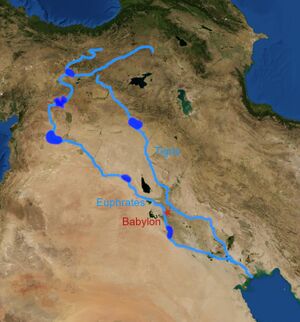BURANUN: Difference between revisions
No edit summary |
No edit summary |
||
| Line 1: | Line 1: | ||
[[File:RiversPlt labelled.jpg|thumb|The two rivers of Mesopotamia with Babylon roughly at the closest encounter (equalling the knot of the cords in the sky).]] |
[[File:RiversPlt labelled.jpg|thumb|The two rivers of Mesopotamia with Babylon roughly at the closest encounter (equalling the knot of the cords in the sky).]] |
||
<sup>mul íd</sup>BURANUN is a Mesopotamian constellation in the western portion of the [[Pisces]] and [[Pegasus]] (Pisces + Pegasus). The association of the Tigris and Euphrates rivers with the two Babylonian asterisms that comprise classical Pisces, Anunitum for the Euphrates and and ‘The Swallow,’ for the Tigris, derives from a sense that the shape of the Tigris and Euphrates river system on Earth in Babylonia, two diverging lines that meet at their middle, mirrors that of classical Pisces in the sky (see figure). |
<sup>mul íd</sup>BURANUN is a Mesopotamian constellation in the western portion of the [[Pisces]] and [[Pegasus]] (Pisces + Pegasus). The association of the Tigris and Euphrates rivers with the two Babylonian asterisms that comprise classical Pisces, Anunitum for the Euphrates and and ‘The Swallow,’ for the Tigris, derives from a sense that the shape of the Tigris and Euphrates river system on Earth in Babylonia, two diverging lines that meet at their middle, mirrors that of classical Pisces in the sky (see figure). Thus, the canal systems of southern Babylonia which connect the two rivers can be thought of as parallel on earth to the knot that ties the two tails of bird and fish-shaped asterisms in the heavens. For ‘Anunitum,’ the Euphrates’ constellation connected with fish and aquatic themes see [Beaulieu 2018, pp. 42-43]. |
||
==Dictionary== |
==Dictionary== |
||
Revision as of 11:43, 6 February 2025
mul ídBURANUN is a Mesopotamian constellation in the western portion of the Pisces and Pegasus (Pisces + Pegasus). The association of the Tigris and Euphrates rivers with the two Babylonian asterisms that comprise classical Pisces, Anunitum for the Euphrates and and ‘The Swallow,’ for the Tigris, derives from a sense that the shape of the Tigris and Euphrates river system on Earth in Babylonia, two diverging lines that meet at their middle, mirrors that of classical Pisces in the sky (see figure). Thus, the canal systems of southern Babylonia which connect the two rivers can be thought of as parallel on earth to the knot that ties the two tails of bird and fish-shaped asterisms in the heavens. For ‘Anunitum,’ the Euphrates’ constellation connected with fish and aquatic themes see [Beaulieu 2018, pp. 42-43].
Dictionary
Kurtik with Hilder, Hoffmann, Horowitz, Kim
Var. reading: mul ídUD.KIB.NUN.KI; = Purattu "Euphrates" [G. 53]
| Sources | Identifications |
|---|---|
Lexic. texts.
|
|
"The Great Star List".
|
|
List of stars VR 46, 1:34.
|
|
Uranologies
|
The name appears quite late, not earlier than the beginning of the 1st millennium BC, as it is absent in Urra XXII. See also a18AL.LUL, s19SIM.MAḪ.
Historical Dictionaries
| Kurtik (2022) | Gössmann (1950) |
|---|---|
| вар. чтения: mul ídUD.KIB.NUN.KI; = Purattu «Евфрат» [G. 53]; созвездие в западной части Рыб и Пегаса (Pisces + Pegasus).
I. Источники. Лексич. тексты. Серия Ḫg. B VI: mul ídburanun = si-nun-tum = […] «Евфрат = Ласточка» [MSL XI, 40:23]. «Большой список звезд». (1) mul ídburanun = mulšim.maḫ «Евфрат = Ласточка»; (2) egir.meš-tum = ídburanunki «Задние (звезды Краба) = Евфрат»; (3) астрологическое предсказание (см. a18AL.LIL) [Mesop.Astrol., App. B:147, 149, 152; Weidner 1959–60, 107]. Список звезд VR 46, 1:34. mulA-nu-ni-tu4 u mulŠi-nu-nu-tuˆ = ídidigna u ídburanun «Ануниту и Ласточка = Тигр и Евфрат» [HBA 52:34; Wee 2016, 162–3:34]. MLC 1866. [MU]L.MEŠ ídIDIGNA u ídBURANUNki ina ṣip-ri mulZIB<me> «Звезды Тигр и Евфрат на острие Хвостов» (D i 8) [Beaulieu et al, 2018, 35, 39, Section A]. Название появилось достаточно поздно, не ранее начала I тыс. до н.э., поскольку оно отсутствует в Urra XXII. Cм. также a18AL.LUL, s19SIM.MAḪ. |
Example |





